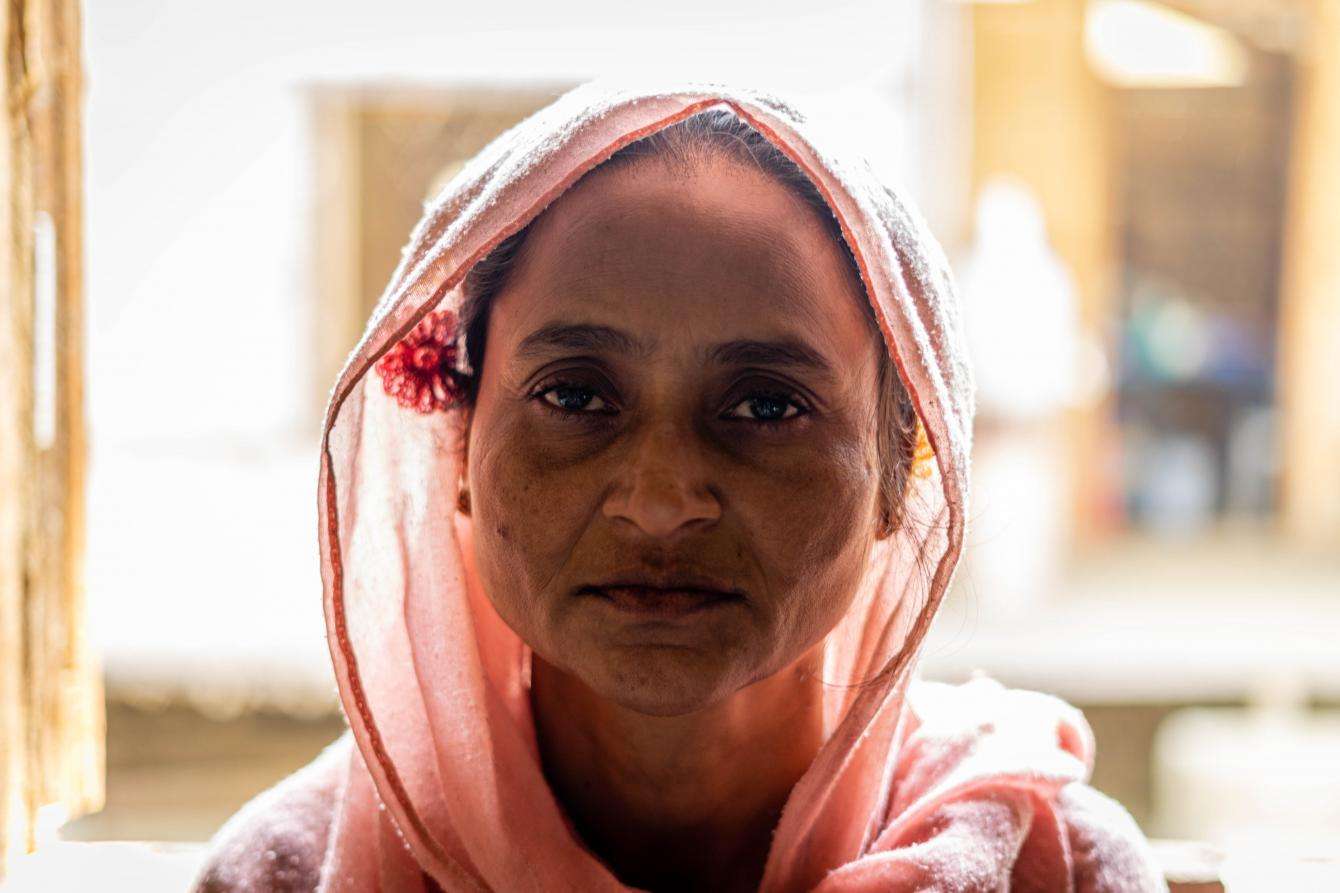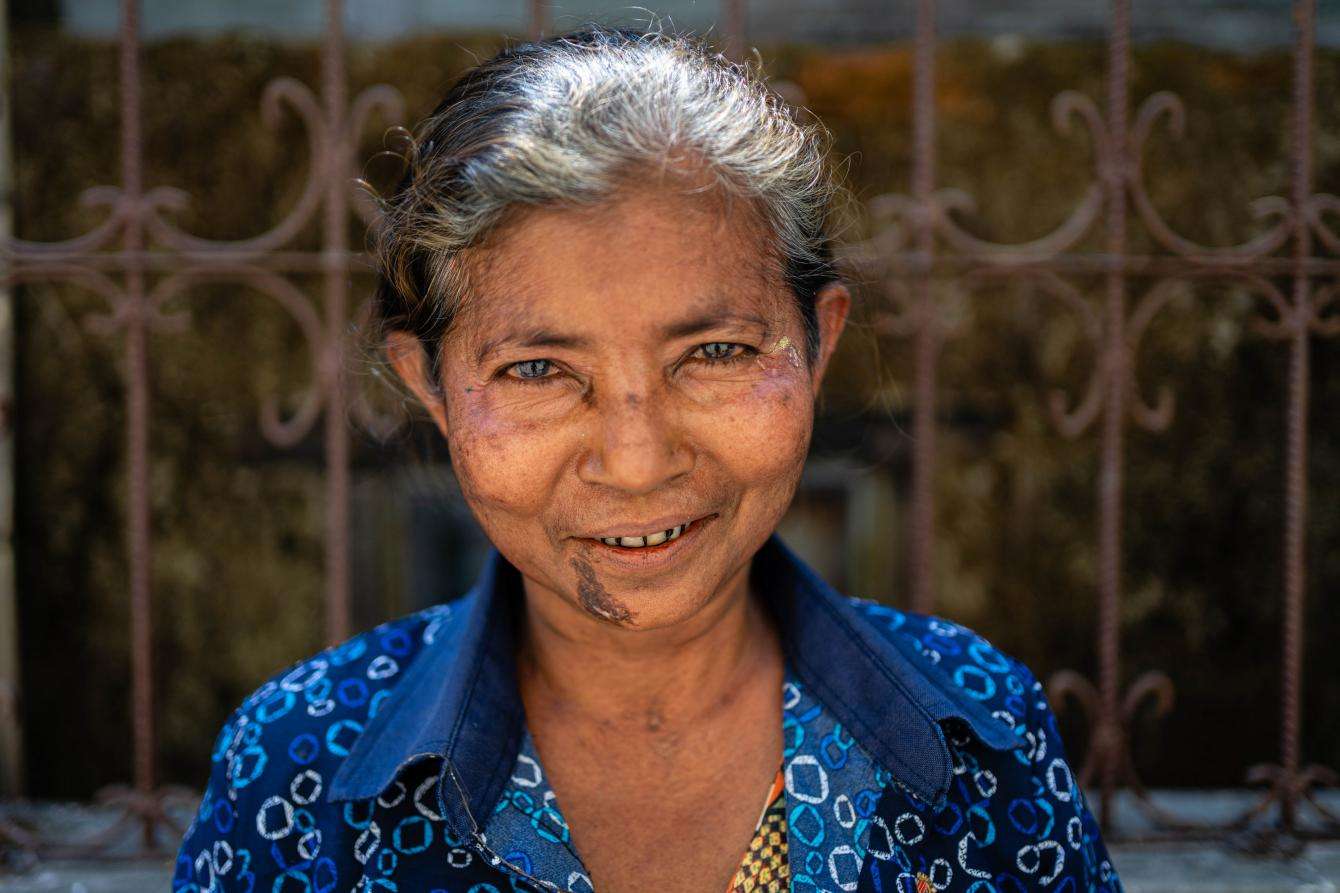On June 9, 2012, deadly communal clashes broke out in Myanmar’s western Rakhine state. Hundreds of people were killed, and thousands of homes—sometimes entire villages—were burned down. Doctors Without Borders/Médecins Sans Frontières (MSF) was forced to suspend most of its medical activities in Rakhine state and it became near impossible for our teams to reach those needing emergency medical care. Violence erupted again in October, and, by the end of the year, more than 140,000 people were displaced.
Zaw Rina lost her home in Pauktaw town during the violence. It was burned down, forcing Rina and her family to flee to Ah Nauk Ywe—a camp on an isolated island in the remote western part of Rakhine state. Ah Nauk Ywe is one of more than 20 camps that were set up for displaced people in the region, most of whom are Rohingya—a predominantly Muslim ethnic minority who have lived in Myanmar for hundreds of years, yet are denied citizenship by Myanmar’s government, leaving them stateless.
The camps are scattered across the region, enclosed with barbed wire fencing, and surrounded by military checkpoints. After the clashes, most families whose homes were not destroyed were also forced to live in camps. In the decade since, several thousand people who were displaced in 2012 have left the camps, sometimes fleeing the country and ending up in squalid camps in Bangladesh or risking their lives in overcrowded boats to reach Malaysia. But, like Rina, 135,000 Rohingya and Kaman Muslims remain, arbitrarily detained in makeshift shelters, with no freedom to move, and no access to paid work, education, or health care.
MSF provides primary health care and emergency referrals for people displaced by conflict in Rakhine. It’s one of the few medical services people living in camps can access. Through MSF’s health care clinics, our counselors and doctors also provide vital mental health care support, including individual consultations, group sessions, and home visits. These services are available to anyone who comes to MSF’s facilities, regardless of their ethnicity or religion.
A decade on and little change
Rina and her family live in a fragile bamboo structure in Ah Nauk Ywe—one of five camps in Pauktaw township that host more than 5,000 people. Narrow, muddy pathways are lined with flimsy shelters. Drainage is insufficient, leaving puddles of stagnant water, a breeding ground for mosquitos that carry deadly diseases. There not enough toilets, and low water supplies, particularly in the dry season, make the facilities extremely unsanitary. Privacy is almost impossible.
The day-to-day reality for Rina and thousands of others living in Rakhine state is marked by a struggle to afford food, fears about safety, and feelings of hopelessness. This has drastic consequences for mental health.

Compounding trauma
For many, the stress of living in these conditions is compounded by other traumatic experiences. Rina’s 20-year-old daughter attempted suicide after her husband asked for a divorce.
“She was having a lot of serious fights with her mother-in-law,” said Rina. “Her husband said [to her], ‘I don’t like you and I want to get divorced. I did not marry you because I loved you.’ [After she attempted suicide] I became very pessimistic and couldn’t find much to be positive about. I shouted at my husband. I shouted at my children. I could not find an answer within myself.”
Across Myanmar, there are huge gaps in mental health care services, leaving people like Rina and her daughter with few options for care. There is one dedicated private mental health clinic in Sittwe, the capital of Rakhine state, but it is too expensive for most people to afford, and psychiatric services at the public hospital are very limited. On top of this, Sittwe is more than six miles from the camps in Pauktaw township, and across the Kaladan river. This distance as well as movement restrictions make it incredibly difficult for people living in the camps to even reach these facilities.
Both Rina and her daughter received counseling from MSF, which helped them better manage their symptoms. “I really felt lost and didn’t know where to ask for help until I met with the [MSF] counselor,” Rina said. “I am feeling better now in terms of my mental health, a lot better, and my daughter [is] too.”

Struggles in the city
Daw Than Than was born to Buddhist parents in Mandalay, but changed her religion when she married a Kaman Muslim person. She now lives with Rohingya and Kaman in Aung Mingalar, a predominantly Muslim neighborhood in the center of Sittwe. Prior to the clashes in 2012, almost half Sittwe’s approximately 200,000 inhabitants were Muslim, but most fled during the violence or were forced into camps, and now only about 4,000 remain. In the decade since, Muslims living in downtown Sittwe have been confined to this small neighborhood that is guarded by police day and night. Residents are unable to leave freely.
Than is widowed. She has no children or family to support her. When she can, she cooks and cleans people’s homes. But the movement restrictions make it difficult to come and go from the neighborhood, and, over the years, she has often struggled to earn an income.

Although movement restrictions into and out of the neighborhood have eased in the last year, allowing Than to move around Sittwe, her physical health worsened, preventing her from working. “I feel sad because I struggle alone in my life,” said Than. “I feel lonely and sad because I have no one to support me when I feel sick. I can’t afford to go to a private hospital.” She also does not have enough money to eat properly, often subsisting on rice and green tea.
Every Friday, MSF runs a clinic in Aung Mingalar where people from the neighborhood can receive basic health care, mental health support, and treatment for noncommunicable diseases.
As long as the root causes of distress remain, people in Rakhine will continue to struggle with mental health issues.
“I have hope my children can get an education one day,” said Rina. “And I want a good shelter so I can live a normal and enjoyable life, like I had back in Pauktaw town. When I lived in my own house, I felt secure.”
MSF has worked in Myanmar since 1992 assisting people affected by conflict and struggling to access health care. Today, more than 1,000 staff provide basic health care, HIV, hepatitis C, and tuberculosis treatment, and referrals to hospitals for emergency and specialized treatment across Kachin, Rakhine, Shan, Tanintharyi, and Yangon states and regions. In Rakhine, MSF teams support communities displaced by conflict, including Rakhine Buddhists, and Rohingya and Kaman Muslims.




